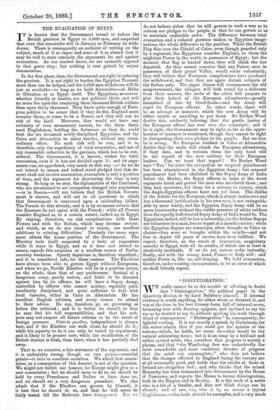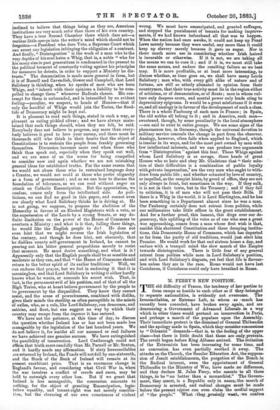" DISINTEGRATION."
WE really cannot be at the trouble of affecting to doubt that " Disintegration," the political paper in the Quarterly Review, is by Lord .Salisbury himself. If internal evidence is worth anything, he either wrote or dictated it, and was at the time in his best literary form, full of internal scorn, brimming over with flouting epigram, and inclined to say his say as be wanted to say it, without spoiling his work through dread of consequences. " Disintegration " is, consequently, de- lightful reading. It is not exactly a speech by Coriolanus, for the writer admits that if you could get the opinion of the nation—which, he holds, we never do—that would be the natural arbitrating force ; but it is an essay by a brilliant and rather cynical noble, who considers that progress is mainly a phrase, and that "the Wandering Jew was undoubtedly the most remarkable and most consistent devotee of progress that the mind can contemplate ;" who does not believe that the changes effected in England during the century are at all necessarily good, and holds that the results of those in Ireland are altogether bad ; and who thinks that the mixed Monarchy has been transmuted into Government by the House of Commons, and expects the House to favour disintegration, both in the Empire and in Society. It is the work of a noble who is a bit of a fatalist, and does not think things can be altered ; and of one, too, who is by no means a typical Englishman,—who looks abroad for examples, and is very much
inclined to believe that things being as they are, American _institutions are very much safer than those of his own country. They have a true Second Chamber there which dare act—a curious little aperqu into the writer's mind which should not be forgotten—a President who dare Veto, a Supreme Court which can arrest any legislation infringing the obligation of a contract. And finally, " Disintegration" is the work of a man who to the very depths of his soul hates a Whig, that is, a noble " who for his many sins in past generations is condemned in the present to the political torment of constantly voting against his principles for measures he detests, in order to support a Ministry he dis- trusts." The denunciation is made more general in form, but it is ,of Russell and Cavendish, Gower and Campbell, that Lord Salisbury is thinking, when he speaks of men who are born Whigs, and "inherit with their opinions a liability to be com- pelled to change them " whenever Radicals choose. His con- tempt for them is unbounded, and is intensified by an evident feeling—peculiar, we suspect, to heads of Houses—that if only the handful of Whigs would join the Tories, the flood- tide of Democracy might be kept out. It is pleasant to read such things, stated in such a way, as pleasant as eating pickled olives ; and we have always main- tained that such things should, when they are felt, be said. Everybody does not believe in progress, any more than every- body believes it good to love your enemy, and there must be thousands still who think in their hearts that the object of Constitutions is to restrain the people from frankly governing themselves. Discussion becomes more real when those who think thus speak out, especially when they speak out well, and we are none of us the worse for being compelled to consider now and again whether we are not mistaking general ideas for established truths. For the same reason that we would not abuse those who in restrained language deny a Creator, we would not scold at those who prefer oligarchy as a form of government ; and as we can bear to discuss the foundation of tolerance, so we can read without anger an attack on Catholic Emancipation. But the appreciation, we confess, comes only from the intellectual side. As •poli- ticians, we can find no good in this paper, and cannot even see clearly what Lord Salisbury thinks he is driving at. He is not going, we suppose, to propose the abolition of the Monarchy in favour of an Elected Magistrate with a veto, or the -supersession of the Lords by a strong Senate, or any de- finite limitation on the power of the House of Commons to overturn a Ministry ; and what is it that, failing these things, he would like the English people to do He does not even - hint that we might reverse the Irish legislation of the century, and though he does hint, not obscurely, that he .dislikes county self-government in Ireland, he cannot be pouring out his bitter general propositions merely to resist that measure. He must desire something, and what is it ? Apparently only that the English people shall be as sensible and moderate as they can, and that " the House of Commons should return to the better spirit of its earlier traditions." Well, we can endorse that prayer, but we feel in endorsing it theta is meaningless, and that Lord Salisbury in writing it either hardly knows what he wants, or conceals his secret wish. That, in fact, is the permanent evil of his position, and of that of all the High Tories, who at heart believe government by the people to begovernment by the disqualified. They know they cannot resist, and the sense of powerlessness, combined with dislike, gives their minds the sterility se often perceptible in the minds df exiles, who,as a rule, like Lord Salisbury, can denounce, and satirise, and flout, but can suggest no way by which their country may escape from the impasse it has entered.
We have not the patience, at this time of day, to discuss the 'question whether Ireland has or has not been made less manageable by the legislation of the last hundred years. We do not believe it, for amidst all our assumed or real failures we 'have achieved one genuine success. We have extinguished the; ossibility of insurrection. Mord Castlereagh could not a'ffirm.that truth more candidly than Mr. Parnell or Mr. Sexton, and it hardly needs any affirmation. If sixty Irreconcilables are returned by Ireland, the Funds will not fall by one-sixteenth, and the Stock of the .Bank of Ireland will remain at its present exorbitant price. That is an enormous change in England's favour, and considering what Civil War is, when the war involves a conflict of creeds and races, may bei held to outweigh every other loss. But if we grant that Ireland -is -leas manageable, the concession amounts to nothing, for the object of granting Emancipation, legis- lative equality, and tenant-right was not merely concilia- tion, but the cleansing of our own consciences of violent wrong. We must have emancipated, and granted suffrages, and stopped the punishment of tenants for making improve- ments, if we had known beforehand all that was to happen. When the nation had once awoke, it could not keep up Penal Laws merely because they were useful, any more than it could keep up slavery merely because it gave us sugar. Nor is there much more use in considering whether Irish hatred is incurable or otherwise. If it is not, we are taking all the means we can to cure it ; and if it is, we must still take the same means, and endure the resulting failure as we beat may. It is more profitable, or at least more interesting, to discuss whether, as time goes on, we shall have many Lords Salisbury ; men who, with every gift alike of nature and of fortune, are still so utterly alienated in opinion from their countrymen, that their true activity must lie in the-region either of criticism, or of denunciation, or of flouts ; men in whom cul- ture only deepens scorn, and mental power only lends sting to depreciatory epigrams. It would be a great misfortune if it were so, and all analogy is in favour of the development of such a class. There is a whole Faubourg of such men in France ; in Spain, the old nobles all belong to it ; and in America, such men— sweetened, though, by some peculiarity in the local atmosphere —are said to exist in entire groups. We see some signs of the phenomenon too, in Germany, though the universal devotion to military service conceals the change in part from the observer. Analogy, however, often fails when applied to England, which is insular in its ways, and for the most part owned by men with few intellectual interests, and we can produce two arguments from " Disintegration " against this fear. These Whigs against whom Lord Salisbury is so savage, these heads of great Houses who so hate and obey Mr. Gladstone that " their solu- tion of their difficulties is a combination of public loyalty withprivate imprecation," are the very men who ought to with- draw from public life ; and whether actuated by love of country, or impelled, as the essayist hints, by greed of office, they are not only always in front, but sometimes in the way. If they sulk, it is not in their tents, but in the Treasury ; and if they fall to criticism, it is of men who will not pass their Bills. If there is a Whig in the world, it is Lord Hartington, and he has been something in a Department almost since he was a man Our Faubourg certainly does not retreat from politics, while our millionaires take little offices in the great establishment. And for a further proof, this lament, this dirge over our de- generacy, this uplifting of the voice as of one who sees a great woe approaching, comes from a man whose first wish is that, amidst this shattered Constitution and these decaying institu- tions, this Democratic House of Commons, which has departed so far from the purity of old traditions, would, just ,elect him Premier. He would work for that end sixteen hours a day, and endure with a tranquil mind the slow march of the ,Empire towards disintegration. There is little fear of any general retreat from politics while men in Lord Salisbury's position, and with Lord Salisbury's disgusts, yet feel that life is flavour- less unless they are in the race. Rome would not have lost Coriolanus, if Coriolanus could only have breathed in Rome.



































 Previous page
Previous page